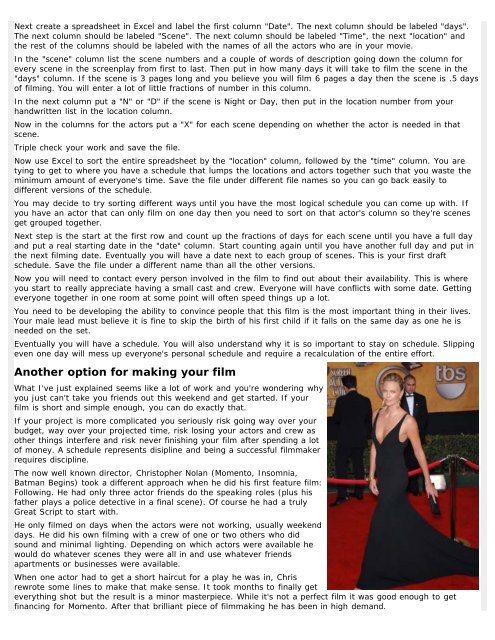The Complete Online Filmmaking Reference - Film Distribution ...
The Complete Online Filmmaking Reference - Film Distribution ...
The Complete Online Filmmaking Reference - Film Distribution ...
You also want an ePaper? Increase the reach of your titles
YUMPU automatically turns print PDFs into web optimized ePapers that Google loves.
Next create a spreadsheet in Excel and label the first column "Date". <strong>The</strong> next column should be labeled "days".<br />
<strong>The</strong> next column should be labeled "Scene". <strong>The</strong> next column should be labeled "Time", the next "location" and<br />
the rest of the columns should be labeled with the names of all the actors who are in your movie.<br />
In the "scene" column list the scene numbers and a couple of words of description going down the column for<br />
every scene in the screenplay from first to last. <strong>The</strong>n put in how many days it will take to film the scene in the<br />
"days" column. If the scene is 3 pages long and you believe you will film 6 pages a day then the scene is .5 days<br />
of filming. You will enter a lot of little fractions of number in this column.<br />
In the next column put a "N" or "D" if the scene is Night or Day, then put in the location number from your<br />
handwritten list in the location column.<br />
Now in the columns for the actors put a "X" for each scene depending on whether the actor is needed in that<br />
scene.<br />
Triple check your work and save the file.<br />
Now use Excel to sort the entire spreadsheet by the "location" column, followed by the "time" column. You are<br />
tying to get to where you have a schedule that lumps the locations and actors together such that you waste the<br />
minimum amount of everyone's time. Save the file under different file names so you can go back easily to<br />
different versions of the schedule.<br />
You may decide to try sorting different ways until you have the most logical schedule you can come up with. If<br />
you have an actor that can only film on one day then you need to sort on that actor's column so they're scenes<br />
get grouped together.<br />
Next step is the start at the first row and count up the fractions of days for each scene until you have a full day<br />
and put a real starting date in the "date" column. Start counting again until you have another full day and put in<br />
the next filming date. Eventually you will have a date next to each group of scenes. This is your first draft<br />
schedule. Save the file under a different name than all the other versions.<br />
Now you will need to contact every person involved in the film to find out about their availability. This is where<br />
you start to really appreciate having a small cast and crew. Everyone will have conflicts with some date. Getting<br />
everyone together in one room at some point will often speed things up a lot.<br />
You need to be developing the ability to convince people that this film is the most important thing in their lives.<br />
Your male lead must believe it is fine to skip the birth of his first child if it falls on the same day as one he is<br />
needed on the set.<br />
Eventually you will have a schedule. You will also understand why it is so important to stay on schedule. Slipping<br />
even one day will mess up everyone's personal schedule and require a recalculation of the entire effort.<br />
Another option for making your film<br />
What I've just explained seems like a lot of work and you're wondering why<br />
you just can't take you friends out this weekend and get started. If your<br />
film is short and simple enough, you can do exactly that.<br />
If your project is more complicated you seriously risk going way over your<br />
budget, way over your projected time, risk losing your actors and crew as<br />
other things interfere and risk never finishing your film after spending a lot<br />
of money. A schedule represents disipline and being a successful filmmaker<br />
requires discipline.<br />
<strong>The</strong> now well known director, Christopher Nolan (Momento, Insomnia,<br />
Batman Begins) took a different approach when he did his first feature film:<br />
Following. He had only three actor friends do the speaking roles (plus his<br />
father plays a police detective in a final scene). Of course he had a truly<br />
Great Script to start with.<br />
He only filmed on days when the actors were not working, usually weekend<br />
days. He did his own filming with a crew of one or two others who did<br />
sound and minimal lighting. Depending on which actors were available he<br />
would do whatever scenes they were all in and use whatever friends<br />
apartments or businesses were available.<br />
When one actor had to get a short haircut for a play he was in, Chris<br />
rewrote some lines to make that make sense. It took months to finally get<br />
everything shot but the result is a minor masterpiece. While it's not a perfect film it was good enough to get<br />
financing for Momento. After that brilliant piece of filmmaking he has been in high demand.


